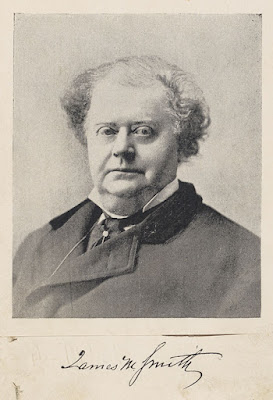Twiggs County Farm Boy Does Well
James Milton Smith, Jr. was born in Twiggs County, Georgia on October 24, 1823. Smith grew up in on the family farm, where he learned to plant cotton and corn. As a young man, Smith became proficient in the art of black smithing. Many thought he was the best "smithy" in the area. Smith attended school at Culloden in Monroe County. Smith became infatuated with the law and set out to make it his life's profession. At the age of twenty three, Smith was admitted to the bar, moved to Thomaston, and set up a successful practice. In his first try for political office, Smith lost the congressional election of 1855.
When the War Between the States broke out in 1861, Smith was elected Captain of D of the 13th Georgia Infantry, the Upson County Volunteers, on July 8, 1861. That same day, Capt. Smith was elected as Major of the regiment. On February 1, 1862, Maj. Smith was elected Lt. Colonel of the 13th Georgia Infantry. On the second day of the Seven Days Battles around Richmond, Virginia, Lt. Col. Smith received a severe wound at Cold Harbor, Virginia. During Lee's push to the north in September of 1862, Col. Smith and his regiment became heavily engaged in the Battle of Sharpsburg (or Antietam.) That day, September 17, 1862, was the bloodiest in the history of our country. Over 22,000 men were killed, wounded, or captured. One of those killed was Col. Marcellus Douglas commanding the 13th Georgia Infantry. The Brigade commander promoted James Smith to Colonel on the battlefield. Smith resigned his commission on December 14, 1863 due to his disability. Colonel Smith was elected to the Confederate Congress and served from May of 1864 until the end of the war.
After the war Smith returned home and formed a law partnership with Peter W. Alexander in Columbus. Smith spoke out publicly against the reconstruction policies of the Federal government. Smith, at the urging of many of his friends, decided to enter the political ring in 1870. This time he was successful. As the new state representative from Muscogee County, he quickly rose to the leadership of the house. In December of 1871, Rep. Smith was elected as Speaker of the House,
garnering 135 out of 157 votes.
Gov. Rufus Brown Bullock's resignation left the office of Governor vacant. Smith, the new leader of the Democrats, was chosen to run in a special election. When the Republican candidate dropped out of the race, Smith became Governor with no opposition.
Gov. Smith entered office after the tumultuous years of Reconstruction. State finances were in shambles. The Governor instituted a policy of fiscal conservatism. The state's credit rating was increased and when Smith left office there was a surplus in the treasury. One of Smith's attributes was his ability to choose men of outstanding ability. Among those were school superintendent Gustavas J. Orr, and Supreme Court justices James Jackson and Logan Bleckley. In 1872, Gov. Smith was elected to serve a full four-year term.
During Smith's term as governor, new government agencies to aid Georgia farmers were created. The Agriculture School at the University of Georgia was established. In 1874, the Agriculture and Geology departments were created.
In 1877, Gov. Smith ran for the Senate of the United States. With the backing of former Civil War era governor, Joseph E. Brown, and Gen. John B. Gordon, Smith had a good chance. Smith bowed out of the race in favor of Benjamin Harvey Hill. As a sort of consolation prize, Col. Colquitt appointed James Smith as the first chairman of the Railroad Commission in 1879. Commissioner Smith served a six- year term and returned to his law practice in Columbus.
In May of 1887, James Smith was appointed a judge of the Superior Court of the Chattahoochee Judicial Circuit, by his good friend, Gov. John B. Gordon. Smith left his lucrative practice to take the office of Superior Court Judge, a position of great honor. Smith was elected to a four year term in the 1888 election. Judge Smith suffered a stroke in 1890 and died on November 25, 1890 after a long illness. Gov. Smith was buried in the Alta Vista Cemetery in Gainesville, Georgia, beside of his first wife, Hester Ann Brown Smith.
Gov. Smith was criticized by many for his association with the "Bourbon" faction of Georgia politics. While he did agree with the Bourbons, Smith did not practice all of their policies, especially the economic ones. Gov. Smith held strong opinions and often expressed them. His outspokenness was often resented, but overall, he was a popular governor of Georgia in its "Coming of Out The Dark Period." The Atlanta Constitution" described Gov. Smith as "one of the boldest and most fearless men in the history of Georgia."


Comments